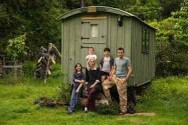
Freedom through Community
Tobias Jones is a co-founder of Windsor Hill Wood community in Somerset. His book about his community, Buy “A Place of Refuge” from Amazon UK, is published by Quercus.
In this extract he talks about why off-grid living is better in a community.
BY TOBIAS JONES
We set up our community, Windsor Hill Wood, six years ago in a ten-acre woodland in Somerset, UK. The sole purpose was to offer sanctuary to those in a period of crisis in their lives: those struggling with addiction, depression, bereavement, homelessness, eating disorders, PTSD, and so on. In that time we’ve had well over a hundred people living in our family home, and the benefits – both to ourselves and to our guests – have far outweighed the drawbacks. It’s just a natural, healthy, wholesome way to live.
Yet in all functioning communities, collective choices are made and have to be adhered to. One of the most fascinating communal experiments that emerged from the hippie movement in the US was The Farm, in Tennessee. Inspired by the late Stephen Gaskin, it began in 1971, as you might expect, as a mirror-image of that age’s free-for-all attitude, but slowly began to incorporate “agreements”, which, over the years, made it a very stable and yet very creative space. Communal choices were made to respect the sanctity of marriage and monogamy, to avoid the use of hard drugs, and so on.
But the greatest obstacle to sharing the lessons of communalism is our warped notion of freedom. The essayist Wendell Berry arrived at the heart of the problem in his 2002 book, The Art of the Commonplace:
. . . there are two kinds of freedom: the freedom of the community and the freedom of the individual. The freedom of the community is the more fundamental and the more complex. A community confers on its members the freedoms implicit in familiarity, mutual respect, mutual affection, and mutual help; it gives freedom its proper aims . . . The freedom of the individual, by contrast, has been construed customarily as a license to pursue any legal self-interest . . .”
It is here that, most clearly, a contemporary observer will glimpse the scary needle that administers the medicine we need: to create any sort of community, we need to pool individual freedoms to gain community freedoms. The latter emerge only through submission and obedience, not through exuberance and incessant self-expression. It is, obviously, a hard sell.
It is hard to find a word held so low in the public esteem as “communalism”. For most people it carries a toxic whiff of both “communism” and “commune”, implying dropouts, flakes, fanatics and cultish leaders. If you’re in any doubt about how frightening the word is to the average citizen, try telling your next-door neighbour you’re going to live communally: they will veer away from you (believe me, I’ve …